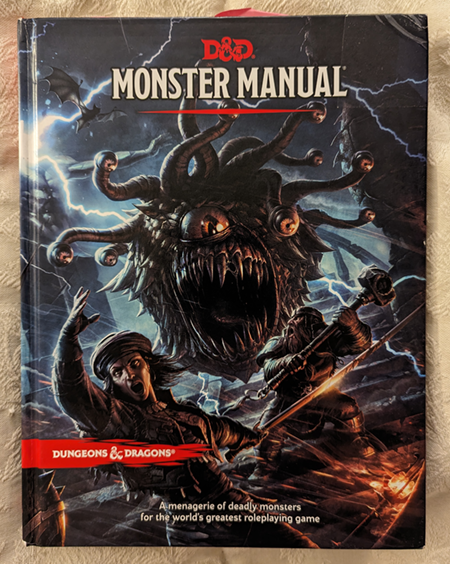The History
Dungeons & Dragons (DnD) is a co-operative, tabletop role-playing game or more commonly referred to as a "TTRPG". Originally designed by Gary Gygax and Dave Arneson in 1974, this game is still going strong. It's undeniable how many movies, video games, board games, and more have been influenced by DnD. DnD itself has handbooks, gaming supplies, magazines, animations, movies, video games, cards, fiction book series, comics, toys, and even a music soundtrack.

Put as simply as possible: it's a storytelling game in which you create a "character", play with other people and their characters in a world with problems to solve, monsters to slay, and more tasks. The DnD publishers give you all the rules of play and content you'd need to run your game (another name for a single DnD game is "campaign"). It's a creative game in which you can change almost anything you want, afterall it's story-telling.
Over the years, several companies had the rights to DnD and over the years these companies changed their licensing, to an Open Game License (OGL) from a Game System License and then back again. Homebrew is unlicensed content for DnD (races, monsters, backgrounds, classes, spells, etc.) created by the players themselves. Without the Open Game License (OGL), Homebrew would either be prohibited or the content creators would have to sell at the least a small amount of the rights to thier unlicensed material to the DnD publishers. These small content creators would suffer and so would the DnD community.
To see a player community of Homebrew items check out DnDBeyond. You can submit your own Homebrew or use some of the thousands on content already on the site in your campaign.
Publishers
- Tactical Studies Rules, Inc. (TSR) (1974)
- Wizards of the Coast (WotC) (1997)
- Wizards of the Coast - as a subsidiary to Hasbro (1999)
Editions
- Original (introduced rules that would become the standard in later editions) (1974)
- Basic Set 1st version - "1e" (1977)
- Advanced D&D (1977)
- Basic Set 2nd version (1981)
- Basic Set 3rd version (1983)
- Advanced D&D 2nd Edition - "2e" (1989)
- Rules Cyclopedia (1991)
- 3rd edition - "3e" (2000)
- v.3.5 (revised version of the 3rd edition) (2003)
- 4th edition - "4e" (2008)
- 5th edition - "5e" (2014)
- 5th edition - "5e" Revised - (2024)
In 2000, under the Open Game License (OGL), the System Reference Document (SRD) was published. It is a reference
for a role-playing game's mechanics that allow other publishers to make compatible material for their games. You can find the actual document(s)
on WotC's Dungeons & Dragons site:
resources/systems-reference-document
There are three books that were published from 1977-1979 (referred to as "core rulebooks") that have gone through some upgrades and changes over the years but nevertheless remain a must-have on the shelves of devoted DnD gamers: Monster Manual (1977), the Player's Handbook (1978), and the Dungeon Master's Guide (1979)

Original Monster Manual (1977)

5e Monster Manual (2014)
Comparable TTRPGs
Star Wars Roleplaying Game
2000
The game was first published by WotC and is currently out of print, however, the game (of the same title) bounced from a few publishing companies and is currently being published by Edge Studio.
Their game themes include Star Wars: Edge of the Empire, Star Wars: Age of Rebellion, and Star Wars: Force and Destiny, just to name a few. Players can play as bounty hunters, colonists, explorers, hired guns, Jedi, and more.
Pathfinder Roleplaying Game (Pathfinder)
2009
In 2002, under contract from DnD publishers Wizards of the Coast, the company Paizo took over publishing DnD's Dragon and Dungeon magazines. Five years later, WotC chose not to renew this contract, so Paizo chose to publish the magazine Pathfinder as a replacement. Unsatisfied with WotC's stricter game license of their 4th edition, Paizo chose to make their own TTRPG, the Pathfinder Roleplaying Game, using DnD's v.3.5 (nicknamed D&D version 3.75). There were, however, some changes made to the game mechanics. The Pathfinder TTRPG remains popular to this day, having a large collection of its own handbooks, video games, cards, fiction book series, and a large online community.
paizo.com/pathfinderStarfinder Roleplaying Game (Starfinder)
2017
In 2017 Paizo released their science fiction equivalent to the Pathfinder Roleplaying Game, the Starfinder Roleplaying Game. The game mechanics as well as the world setting are the same as Pathfinder.
